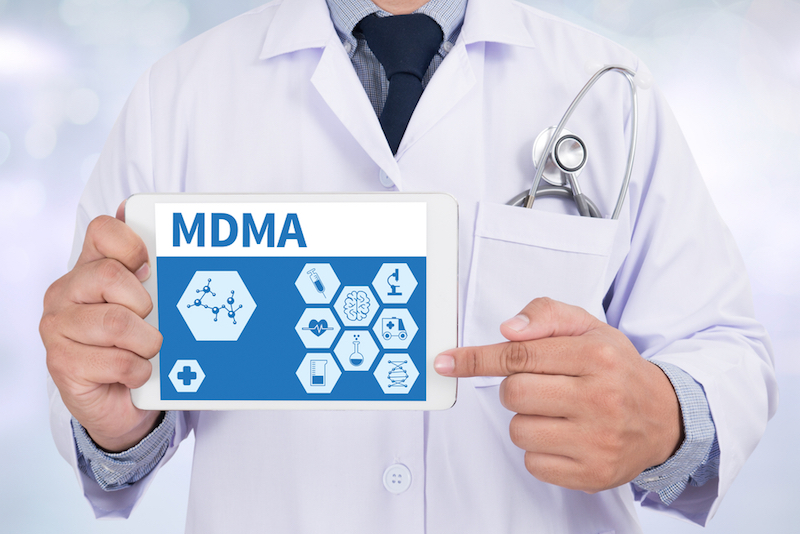
The active ingredient in the drug ecstasy needs more study, and changes are needed to make it easier for scientists to access the drug for research, two neuroscientists argue in a new opinion article.
The ingredient, MDMA, which is the psychoactive substance in ecstasy and Molly, needs more study because it seems to unique amongst mind-altering substances, said study co-author Dr. Robert Malenka, a psychiatrist and neuroscientist at Stanford University in California.
"It has an effect in both animals and humans that, to my knowledge, is pretty much unlike that of any other psychoactive substance," Malenka told Live Science. "It uniformly causes this pro-social, empathogenic response," or warm-fuzzy feelings of empathy towards others, said Dr. Robert Malenka, a psychiatrist and neuroscientist at Stanford University. [Trippy Tales: The History of 8 Hallucinogens]
A banned substance
MDMA was created in the early 1900s by the German pharmaceutical company Merck as a base compound for synthesizing other drugs, according to the National Institute on Drug Abuse. But the compound was never used in clinical practice and languished on chemist's shelves for decades. Then, in 1976, the chemist Alexander Shulgin, a "psychonaut" who spent most of his life testing and cataloguing the psychoactive effects of thousands of chemical compounds, noted MDMA's chemical similarity to compounds such as mescaline and amphetamine.
He self-administered the drug and then told a small group of psychotherapists and physicians about its effects, according to the article. From then on, a small group of physicians used MDMA during psychotherapy, hoping to help patients who had extreme social anxiety and post-traumatic stress disorder (PTSD).
But in the 1980s, MDMA made its way into clubs and raves as a party drug, and by the middle of that decade, the U.S. Drug Enforcement Agency had banned the substance as a Schedule 1 drug, meaning the agency had decided the substance had no therapeutic value and a high potential for abuse.
The drug can also have side effects; it can cause anxiety, restlessness and irritability, along with physical symptoms such as nausea, muscle cramping and a rise in body temperature, according to the National Institute on Drug Abuse. People who overdose on MDMA may lose consciousness and have seizures.
Get the world’s most fascinating discoveries delivered straight to your inbox.
Since its classification as a Schedule 1 drug, research on the MDMA has been tightly controlled, with a few small research studies looking into the drug as a potential treatment for people with post-traumatic stress disorder. In those very small, carefully controlled trials, the drug has been shown to be more effective than existing treatments for post-traumatic stress disorder and to have an effect that lasted for years. [6 Party Drugs That May Have Health Benefits]
Case for improved research access
In the new opinion piece, Malenka and his colleague Dr. Boris Heifets, an anesthesiologist at Stanford University, argued that the DEA's ban is too restrictive. The drug has the unique ability to foster empathetic, loving, "pro-social" emotions, the researchers said.
They pointed to an example, from a study participant who took MDMA in 2013, who wrote, "I had never before felt what I felt today in terms of loving connection. I'm not sure I can reach it again without MDMA, but I'm not without hope that it's possible. Maybe it's like having an aerial map so now I know there's a trail."
The drug may ease PTSD symptoms in multiple ways. It may increase a patient's feelings of trust, empathy and bonding toward his or her psychotherapist, allowing the patient to overcome feelings of anger, emotional numbness and intense anxiety during treatment, the researchers said in the article, which was published Thursday (July 14) in the journal Cell.
Moreover, MDMA may also be a great probe to investigate the biological underpinnings of empathy and sociality in the brain, because the time course of ecstasy's breakdown in the body is highly predictable. That means that brain changes occurring in the several hours after MDMA ingestion can reasonably be tied to the drug's action, revealing which brain regions are activated or dampened when people feel social, loving or empathetic on ecstasy, the researchers argued.
Big unknowns
It's important to reduce regulations that prevent research into MDMA, said Dr. Gillinder Bedi, a psychiatrist at Columbia University in New York, who has studied the effects of MDMA in her own research, but was not involved in writing the new opinion article.
However, it's not clear that the drug is "among the most promising lead therapies for psychiatric disease," said Bedi, in response to this statement in the opinion piece. The PTSD trials were small, and even less research has been done on MDMA's possible impacts on people with other psychiatric conditions, she added.
"Without a lot more research, we can't say very much about which patients might be helped by treatment," Bedi told Live Science. "Without the data, we are often left with polarized opinions, with some people arguing that MDMA is a dangerous and addictive drug, and others viewing it as some kind of magic bullet to mental well-being. The reality, of course, will be somewhere in between."
Don't try this at home
Patients who showed improved PTSD symptoms in past research were carefully prepared prior to MDMA use, and were given psychotherapy to integrate their experience of using the drug into their treatment. They were also monitored closely for physical side effects. But people who use the drug recreationally do not seem to have any lasting improvements in mental health or social functioning as a result, suggesting MDMA must be carefully contained within a therapeutic setting to show benefits, Bedi said.
"Therapeutic use of MDMA is vastly different from recreational use. This is really important to prevent people from trying to self-medicate their own symptoms using this drug," Bedi said.
It's even less clear that MDMA would be helpful for people with other psychiatric illnesses, such as extreme social anxiety or autism, conditions in which people have trouble either understanding or empathizing with the emotions of others, Bedi said.
Empathy isn't just "feeling the love." It's a complex experience that involves both recognizing someone's emotional state and then echoing that emotional response, Bedi said. But people taking MDMA show a lower ability to recognize certain negative emotions, such as fear, in others, past studies have found.
"MDMA certainly makes people feel that they are more empathic," Bedi said. "Whether or not they actually are more empathic is a different issue."
Original article on Live Science.

Tia is the editor-in-chief (premium) and was formerly managing editor and senior writer for Live Science. Her work has appeared in Scientific American, Wired.com, Science News and other outlets. She holds a master's degree in bioengineering from the University of Washington, a graduate certificate in science writing from UC Santa Cruz and a bachelor's degree in mechanical engineering from the University of Texas at Austin. Tia was part of a team at the Milwaukee Journal Sentinel that published the Empty Cradles series on preterm births, which won multiple awards, including the 2012 Casey Medal for Meritorious Journalism.


